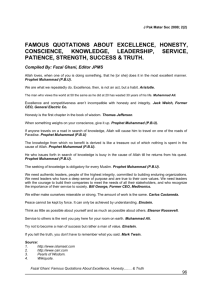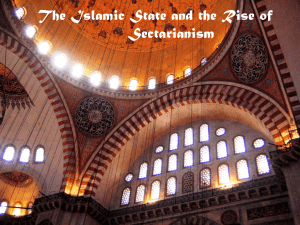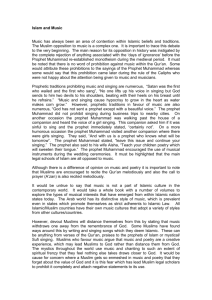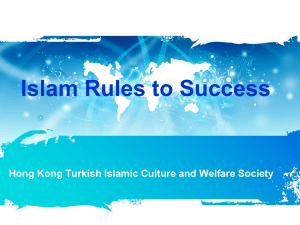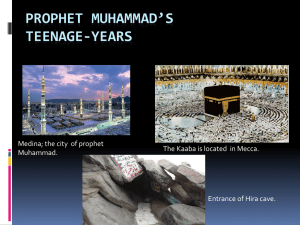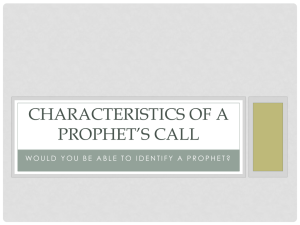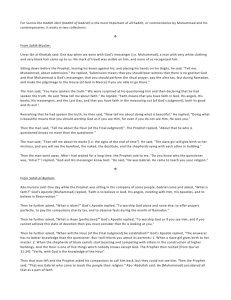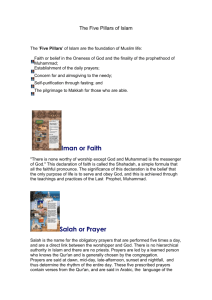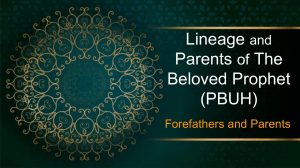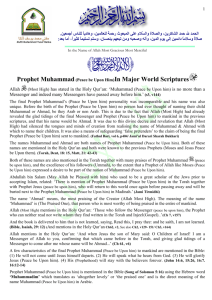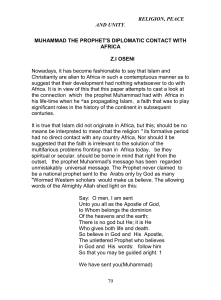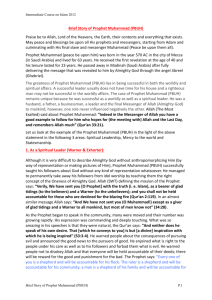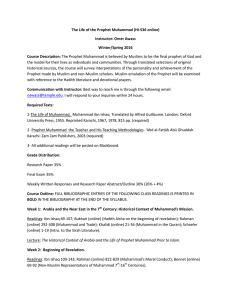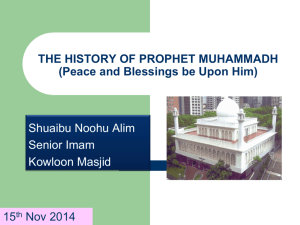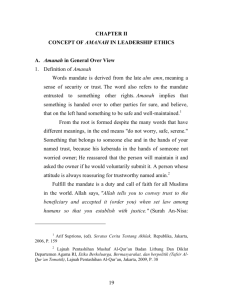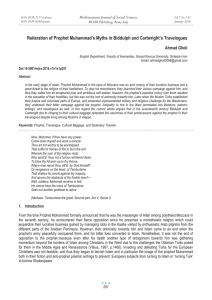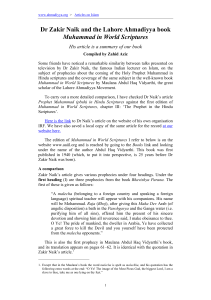The Life of the Prophet - San Diego State University
advertisement
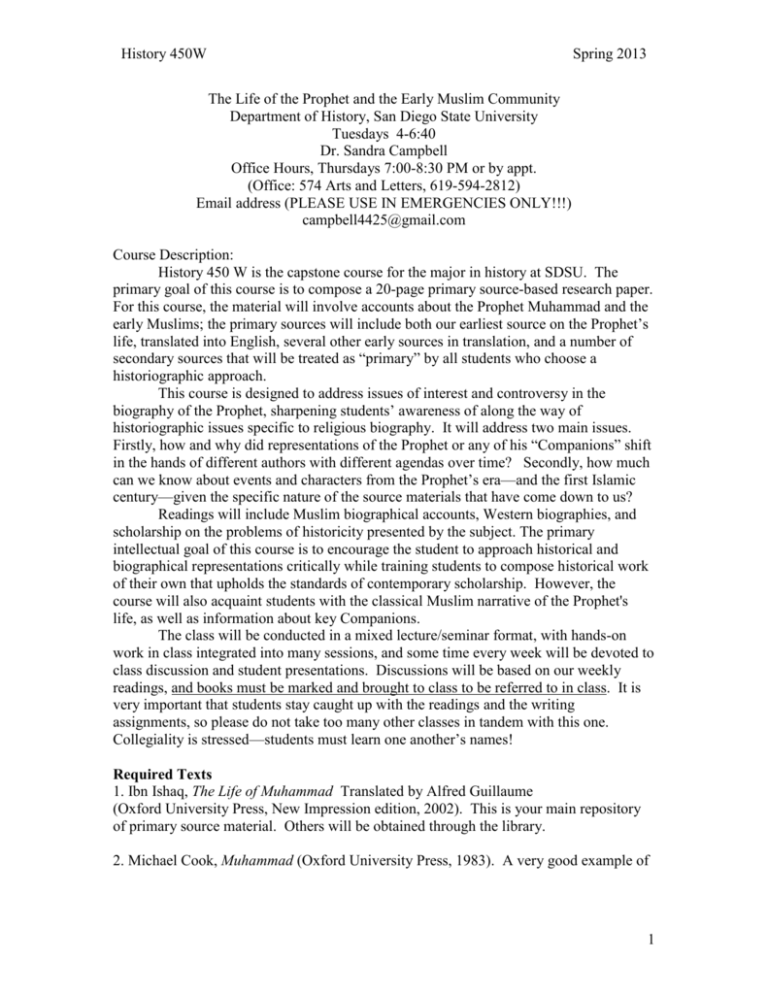
History 450W Spring 2013 The Life of the Prophet and the Early Muslim Community Department of History, San Diego State University Tuesdays 4-6:40 Dr. Sandra Campbell Office Hours, Thursdays 7:00-8:30 PM or by appt. (Office: 574 Arts and Letters, 619-594-2812) Email address (PLEASE USE IN EMERGENCIES ONLY!!!) campbell4425@gmail.com Course Description: History 450 W is the capstone course for the major in history at SDSU. The primary goal of this course is to compose a 20-page primary source-based research paper. For this course, the material will involve accounts about the Prophet Muhammad and the early Muslims; the primary sources will include both our earliest source on the Prophet’s life, translated into English, several other early sources in translation, and a number of secondary sources that will be treated as “primary” by all students who choose a historiographic approach. This course is designed to address issues of interest and controversy in the biography of the Prophet, sharpening students’ awareness of along the way of historiographic issues specific to religious biography. It will address two main issues. Firstly, how and why did representations of the Prophet or any of his “Companions” shift in the hands of different authors with different agendas over time? Secondly, how much can we know about events and characters from the Prophet’s era—and the first Islamic century—given the specific nature of the source materials that have come down to us? Readings will include Muslim biographical accounts, Western biographies, and scholarship on the problems of historicity presented by the subject. The primary intellectual goal of this course is to encourage the student to approach historical and biographical representations critically while training students to compose historical work of their own that upholds the standards of contemporary scholarship. However, the course will also acquaint students with the classical Muslim narrative of the Prophet's life, as well as information about key Companions. The class will be conducted in a mixed lecture/seminar format, with hands-on work in class integrated into many sessions, and some time every week will be devoted to class discussion and student presentations. Discussions will be based on our weekly readings, and books must be marked and brought to class to be referred to in class. It is very important that students stay caught up with the readings and the writing assignments, so please do not take too many other classes in tandem with this one. Collegiality is stressed—students must learn one another’s names! Required Texts 1. Ibn Ishaq, The Life of Muhammad Translated by Alfred Guillaume (Oxford University Press, New Impression edition, 2002). This is your main repository of primary source material. Others will be obtained through the library. 2. Michael Cook, Muhammad (Oxford University Press, 1983). A very good example of 1 History 450W Spring 2013 the skeptical approach to the sources—short, loaded, readable, this work demands rereading. 3. Fred Donner, Muhammad and the Believers: at the Origins of Islam (Harvard University Press, 2002). An important and very influential work. 4. W. Montgomery Watt, Muhammad: Prophet and Statesman (Oxford University Press, 1961) The most influential presentation of the Life of Muhammad in English to date. This is your first reading. 5. The volume of the English translation of al-Tabari’s History (of Prophets and Kings) that best suits your topic. You will either buy this via Amazon or “interlibrary loan it” if the relevant volume from our library is already checked out. This is your second primary source. Additional readings will be handed out or given as online readings. Assignments 1. Author / Topic Reports Collegially compete for the highest marks on clarity, usefulness of the information, and the best use of resources in presenting on important authors of biographies of the Prophet. Authors and Scholars to be treated include: Ibn Ishaq and Ibn Hisham; al-Tabari; Fred Donner; Michael Cook; Gerlad Hawting; Muhammad Husayn Haykal; Patricia Crone, Montgomery Watt. Others will be added. 2. Weekly Summaries, including oral participation. Every week excepting the first week, there will be assigned readings. Re-reading is essential. 3. Presentations and instructions on the “mechanics” of working in the field. A. Students will be asked to present on various matters such as how to write a footnote vs. how to write a bibliographic entry, how to cite a website, order a dissertation, use the Index Islamicus, use and cite the Encyclopaedia of Islam, order books through inter-library loan, etc. All students will be required to order books through interlibrary loan, without exception. B. All students will be asked to look up various topics in the Encyclopaedia of Islam, New Edition (EI2) to summarize and present on the contents of various EI2 articles. 4. The History Paper: A Series of Steps. In this paper, you will pursue some aspect of (or episode in) the life of the Prophet Muhammad or any early Muslim figure as it is represented in various biographical and historical sources. The final paper can show how differing interpretations of that aspect, episode or figure serve different interests. The object of this paper is never to marshal evidence for "proving," or "disproving" the legitimacy of Islam or to “assess” Islamic belief. In the paper, students 2 History 450W Spring 2013 will critically compare the various treatments of their topics, using both the material treated in class and additional sources, identifying historiographic patterns if possible. Remember, we will still be pursuing readings as you work on this. Start to find materials early on! You will have to use interlibrary loan, so plan on it. A. Paper proposal: ungraded, but shared with peers You will be asked to write a short, two-page proposal along with a single page bibliography. You should include a framing question (what are you asking about here?), a hypothesis (what do you guess is the case?), the justification for that hypothesis (why do you think that?), and a defense of why it might matter (why is this important to think about?). Also include two footnotes each from two different sources in your proposal. (You will be allowed to change topics within two weeks of this.) B. Notes from your readings on this topic. Eight pages of typed notes, with page numbers, from 3 or 4 sources on your topic. Here you are trying to get the rough material for discerning a pattern. Does you original hypothesis hold up now that you look at the material more closely? Must you shift you argument? Evidence takes priority over argument; you might reformulate your argument in light of it. C. The “first draft.” 8-10 pages. These will be carefully read by your peers in class—so be kind to them! This will be a “working day” in class. You must pair off twice and work with one another on these, silently at first, then out loud. This draft must have: 1. An introduction—what are you asking here? Why might it matter? How are you approaching it, how is the material organized? 2. A body with “rubrics’ or headers: break the text into logical sections, with paragraphs that flow naturally from one to the next. 3. A conclusion. You can change this later, but include one for now. What have you shown us? Do you have any caveats? Do you think it is wise to concede that the material does not show an entirely coherent pattern, but seems only to suggest certain conclusions? A second, revised draft will be reviewed in class—peers’ comments must have been addressed. This will be handed in, along with the first draft. It must be fuller at this point—aim for 15 pages. The final draft. This must have been fully edited. The aim is to compose a potentially publishable 20-page paper, in impeccable English, and in accordance with the norms of the field. This version must be handed in inside a folder with the other drafts. Attendance Participating in class discussion is obviously crucial to your grade. I will be noting participation, as will you. Obviously, those who do not attend, and therefore cannot participate, will earn fewer points. Make-up policy In case of major medical or other emergency, for which there is documentation, please speak to me. Otherwise, there are no make-ups. 3

